Though he totally missed the Oscar loop, you have to give some
credit to media magnet Tom Cruise for releasing his World War II
drama, Valkyrie at the end of 2008 despite the surge of
Nazi-inspired holiday fare. Anytime a star of his stature dons a
Nazi uniform and parades around Berlin in jackboots while enjoying
face time with a cinematic Adolf Hitler, it invites ridicule. Yet by
playing the stone-faced Colonel Claus Philipp Maria Schenk Graf von
Stauffenberg who made the final coup attempt against The Fuhrer
Cruise provided audiences with a bete noir to his Jerry
Maguire-esque stereotype.
Certainly this wasn't a follow-up to his comedic cameo in Tropic
Thunder where he does an astounding parody of the ultimate
Hollywood exec the kind that Cruise, as an executive among the
team running United Artists, clearly knows intimately.
For a long time, the 46 year-old actor had been Mr. Moneybags, the
most bankable star who could sell a movie even if it had a thin
premise. But as he has gotten older, and taken on the
responsibilities of a producer, maintaining that star power and
financial dominance isn't as much of a challenge to him or that easy
anymore.
So in light of seeing the media character, or even parody that
Cruise has become, he turned to making Valkyrie, a film
that's not a standard heroic starrer. Cruise turns to this
devastating period and to a character that ambiguously seems valiant
in his goals and means, except that he was an archconservative whose
goals sometimes intersected with Hitler's. Maybe in regaling us with
the lavish, subtle eroticism of boots and black leather, Cruise does
his Nazi with a cinematic flair, but the complex implications of
this character and era require serious contemplation not just flair
something Cruise and director Bryan Singer addressed in this
interview drawn from a recent press conference.
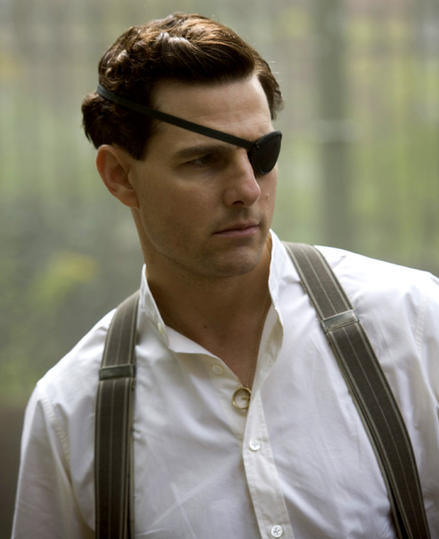 Valkyrie
has come out at a time when other Nazi-era films have been
released but this film has a different angle from the others and
it's an important too to educate the public about the Germany of
that time.
Valkyrie
has come out at a time when other Nazi-era films have been
released but this film has a different angle from the others and
it's an important too to educate the public about the Germany of
that time.
Tom Cruise:
It's something that Bryan and I have spoken about that it's
important to know that not everybody felt that way and fell into the
Nazi ideology. To me, that was surprising. To take this story and
it's such a massive, comprehensive story; we could've made this a
five-hour, ten-hour, miniseries it could've been very different
kind of movie. [But] Bryan was always specific: this is a suspense
thriller about killing Hitler. It's not a bio-pic. That [the story
is true] was a bonus, really, for the film.
Bryan Singer:
It's not a "Holocaust" movie. There are movies that happen to take
place [about] this subject matter that are coming out around this
time, but it's a coincidence. This is far from a Holocaust movie.
It's a conspiracy thriller about assassinating Hitler. As Tom was
just saying, the bonus is that it happens to be true, it happens to
be gripping. And even things that you might think are film
conventions some of the twists and turns actually really did
happen.
Tom Cruise:
We spent eight months working [together], and Bryan spent more time
before that. Bryan wanted me to come on board, and I started working
with him, writers Chris [McQuarrie] and Nathan [Alexander]. Every
time we started talking about the Holocaust and the different
characters, and trying to put as much into that story as possible,
Bryan always went back to, "This is a piece of entertainment. This
is a suspense thriller about killing Hitler."
The more you know about the history of it, [you find] there
are so many moments we were able to put in there. Von Stauffenberg
despised the Nazis, [yet] as a parent [he had to] look at his
daughter saluting him. On that day, July 20th, 1944, his son was
indoctrinated into the Hitler Youth. These are the moments Bryan
wanted to seed in there, but [he] never var[ied] from the picture
that he wanted to make. We wanted to [make] this movie [accessible]
to a broader audience.
What was it about Claus von Stauffenberg that made this role so
irresistible to you?
Tom Cruise:
When I first read the script, I thought how incredibly suspenseful
it was. Right from the beginning, I thought it was a great story,
this is a suspense thriller. I went, "Whoa. It's cool." Stauffenberg
went to Hitler the day after D-Day; you find out it really happened.
It is definitely an important story. I'd never heard [of] it before.
I grew up playing with the neighborhood kids in the yard, wanting to
kill Nazis, wanting to kill Hitler. As a child, I [wondered], "Why
didn't someone just shoot him?" And, [after] sitting down with Bryan
and finding out it was a true story, and I wanted to work with him,
off we went. Bryan is someone I've always wanted to work with. [I
was first introduced to Bryan] when I saw his film The Usual
Suspects but we actually met at the premiere of the first Mission
Impossible. And I said, "Man, I want to work with you." He was
totally accurate to the behavior and what was happening during that
time period. I really respect Bryan's staging, his composition, and
his storytelling. When I look at his movies, it's very cinematic,
classic storytelling. So you don't see the hand necessarily until
you see that it's missing. They build to that so you see it in the
bed. I've always felt that you want to get it right. And within the
limited amount of time, and economics, you want to do the best that
you can for the audience, for the subject matter, whatever it is.
The most important thing is the film, because I want to entertain an
audience, and when I'm making a film, that's so important.
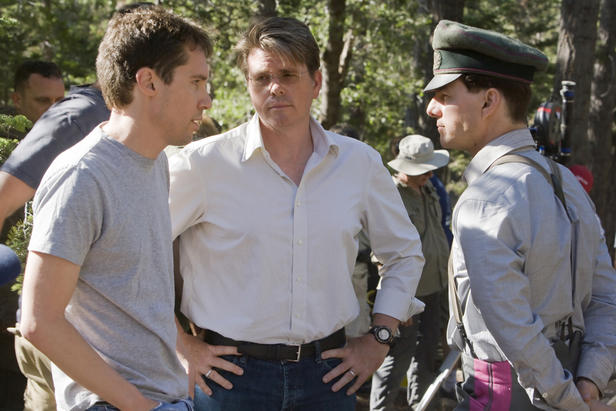 You
two seem to have a partnership as much as an actor-director
relationship. What's the difference in working together as producers
and then working together as an actor and director?
You
two seem to have a partnership as much as an actor-director
relationship. What's the difference in working together as producers
and then working together as an actor and director?
Tom Cruise:
I have great respect for him as a filmmaker, as a storyteller. Out
of a scale of one to 10, I think this film is a 20. It was a
challenge to make.
Bryan Singer:
We spent a lot of time; we had Tom's interest in the project as well
as position at the studios. We have the freedom to spend a lot of
time working together, working with Chris and Nathan, and talking
about the project. We have a lot of fun
talking. We had meetings at Tom's house 12 hours long. We camped out
in the desert when we were shooting the desert sequence, and
everyone's families were there. When we moved to Germany, we learned
more information. We had some good experiences.
And then once we get on the set, he becomes an actor. And I
become a director and for my experience, there was never any
difference. I knew that no matter how many takes I asked him to do,
it would never be as many as Stanley Kubrick did [laughs].
And we tried, we experimented, and it was phenomenal, because
anything you'd [saying to Cruise] ask anything, you'd be like,
"Let's do it." There was never a lack of wanting to try and never a
lack of trust. And then afterwards, [there
was] the full support of an actor it's a rare opportunity with
Tom. As a director, you always feel like nobody cares about the
movie as much as you do. What you probably see here is a
relationship with someone who cares about this movie as much as I
do.
Tom Cruise:
I want to be directed. I enjoy that. I do like to be directed. I
don't stand outside myself and direct myself. And I have a lot of
fun doing it.
Bryan Singer:
He doesn't come to the monitor and look at it and say, "Oh, there's
none of that," which some actors do.
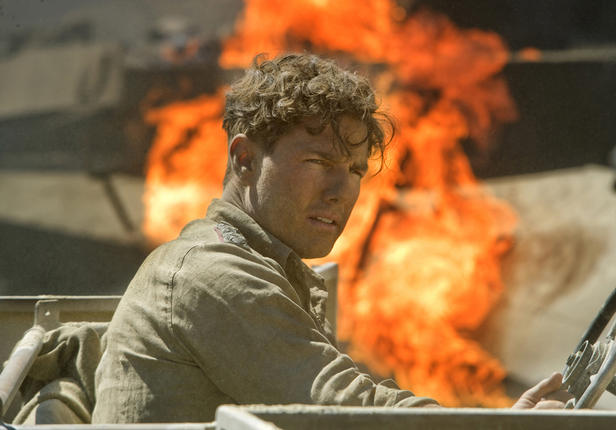 Tom
Cruise:
As an actor, getting direction from Bryan, he gave great notes on
behavior and we were just tracking. I like that in a movie where as
an actor I'm tracking with the director.
Tom
Cruise:
As an actor, getting direction from Bryan, he gave great notes on
behavior and we were just tracking. I like that in a movie where as
an actor I'm tracking with the director.
Bryan Singer:
It's been a really great journey, but one that comes from caring
about the project.
Tom Cruise:
There's certain things that Bryan knew from a story sense how you
want to build to those moments, because there [are] little pieces
that build to a moment. There are moments where there's tension,
you've got to take the audience along and build that tension. Every
scene has to move the story along, but every scene you're revealing
more about the characters. There [are] rhythms and structure to a
movie that I love as an audience. When I read a script, when I'm
seeing a movie, I see it like an audience and not necessarily as a
filmmaker, particularly when I get caught up in the picture.
Does Tom Cruise, the actor, compete with Tom Cruise, the
businessman?
Tom Cruise:
I've produced a lot of films. Mission Impossible was the first film
that I produced and then I produced all the Mission films,
and The Last Samurai. So there's always the balance of art
and commerce, and the challenges of that. And it's not just having
talent in making a film, it's also important to know to surround
yourself with great people. I've got very good people that I work
with. I've always tried to surround myself with people that I
respect, that I enjoy working with, and that's what we have. I'm
very happy to have these guys on board with MGM. At the studio it's
actually a very exciting time, with Mary Parent, who's come on at
MGM. But I am an actor first and foremost. That is my love.
You both
have had so much control over the project. Why wasn't it just put
into a December release originally; at one time it was scheduled for
October and then, February 2009?
Bryan Singer:
Originally, the schedule of completion had to do with that. It was
going to come out a lot earlier, but then the Tunisia sequence took
time. I ended up scouting Jordan for a location, and then Spain, but
those two locations didn't work out, both aesthetically and
economically. We figured we would just see
what movie we had when we got home. [We'd] cut it all together, and
then go back and go to California where the location we found looks
far more like Tunisia. Cougar Buttes, that's where we shot. We would
have the equipment and resources, and we would sort of drop and pick
up. And then that moved our release day.
It was a crowded Christmas, but we didn't know where we were at
finishing the movie. Is that pretty much as you remember it?
Tom Cruise:
You know we were making a film not for a release date, to be honest
with you.
Bryan Singer:
Yeah, exactly. Thank you.
Tom Cruise:
February was never a firm date. We also never wanted to say, "Hey,
we want to put it in awards season." That's not even why we moved to
Christmas. Christmas is a great time for audiences. It's the biggest
time of the year for people to go [to movies]. You want to put your
film where it can [be] available to as broad an audience as
possible.
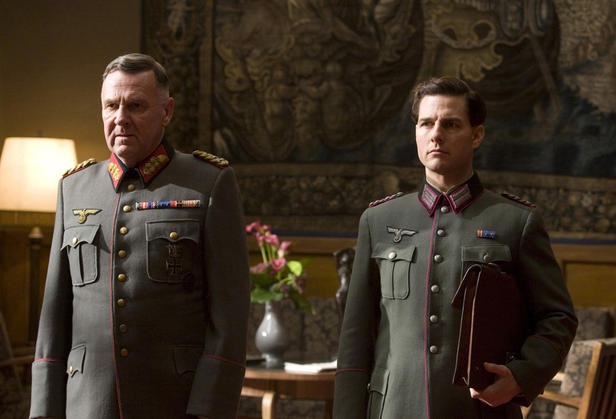 So
what were the challenges and rewards playing this character?
So
what were the challenges and rewards playing this character?
Tom Cruise:
The rewards are that I thought it was a very exciting film. It's a
story I'd never heard of before. And I wanted to work with Bryan
Singer [as I said]. I loved Chris's script [and] to be able to work
with these actors. That's the reward every day, going in and having
that challenge... and, as I said, to entertain an audience. I
thought it'd be a very compelling story and a fascinating film.
That's what I like. That's what I'm looking for in a film.
When I'm making movies, it's about "us," it's not about "me."
It's about the journey that we all take together. We got to shoot in
locations where these people [lived and where] they died, which was
very powerful to be there and to see that world.
I grew up wanting to travel the world and I wanted an
adventurous life. Sometimes [there was] a little more adventure than
I had ever bargained for [laughter]. But this was something I didn't
want to pass on.
Bryan Singer:
Chris and I used to make war films in my backyard.
Tom Cruise:
And I saw the World at War. The way that this film was
directed, [it's] not like anything that I've seen these films that
I greatly admire: Schindler's List and Paths of Glory.
But this is very different.
From the
military formations to the assassinations, the [orchestration] was
pretty amazing and quite ominous. What was it like for you, Bryan,
in the directing and you, Tom, in performing this... that it was so
precise?
Bryan Singer:
Well, [we] stud[ied] a lot of war photography. There was a huge
amount. Hitler filmed everything, so we had the benefit of a lot of
both color and black & white motion picture film of that era. Also,
we were in Germany so we shot with Arriflex cameras and the Zeiss
lenses. And also, with color, I wanted to give a sense of vibrance
so it would look like it did to people who lived back then, as
opposed to trying to approximate black & white or muddy the film or
desaturate it. The pageantry and the
military aspects of it we have, thanks to all that recorded film
material. And then we worked with the military advisors who knew the
history, and who could help us with the movements and the salutes.
So we could have authenticity regarding the difference between the
way a colonel would salute a major, or a field marshal, or the
Fuhrer.
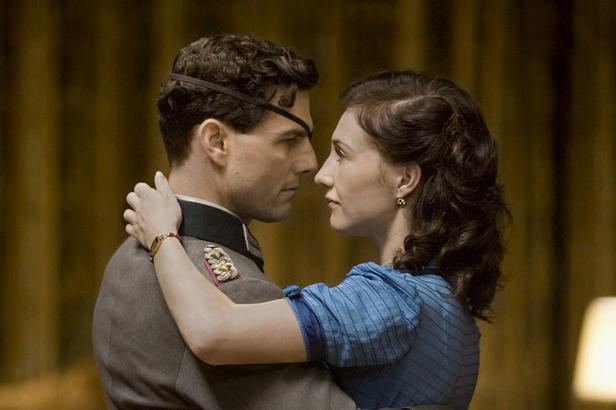 Tom
Cruise:
And specifically at that time period. There is actual dialogue in
the film that I discovered were from letters [and] journals that
Chris and Nathan had studied.
Tom
Cruise:
And specifically at that time period. There is actual dialogue in
the film that I discovered were from letters [and] journals that
Chris and Nathan had studied.
Bryan Singer:
Yeah, which changed after the assassination attempt. Certain things
were more mandatory. And that's what made the scene where he throws
up his hand. If you were missing your hand, you wouldn't put it up
and give the Heil Hitler salute. And that's why it's interesting
that he does. He shows his stump.
Tom Cruise:
This is a film that, right in the beginning, needed that kind of
dynamic orchestration, and you had to be very specific in editing
these pieces together. That was all very thought out. From top to
bottom of the production, we really had a lot of help and support
from the Germans their production, the stuff that they gave us.
When you talk about colors, the reds, the whole point is to try to
give that audience that visceral feeling of being on the edge of
their seat, even down to the wardrobe.
[In] wardrobe with Joanna Johnston, a lot of time and attention went
into this the kind of fabrics, and also studying the fact that
certain people would make their own uniforms.
And so [too] with Tom Sigel [cinematographer]: the kind of
film that he used, the lighting that he used. The level of detail in
the film even down to Hitler's signature, [which] was, to the best
of our knowledge, exactly the signature that he signed at that time
period. Same with Stauffenberg. This is the kind of stuff that we
film geeked and history geeked out on.
Bryan Singer:
People were taken blindfolded to the homes of people who collected
Hitler's furniture so we could see it and know the furniture at the
Berghof, his summer house. There are people who collect this stuff
secretly in Germany.
Are they neo-Nazis?
Bryan Singer:
I don't know, they just like the furniture; [they're collectors].
Tom Cruise:
There's certain things you go, "Look, I don't care. I don't wanna
know. [laughs]." But we're very happy to have the desk in his
office...
Bryan Singer:
I had lunch with Hitler's bodyguard, [Cruise] wouldn't go.
Tom Cruise:
It was good for the director to have it. He needed that. I didn't
need it. I'll read about it.
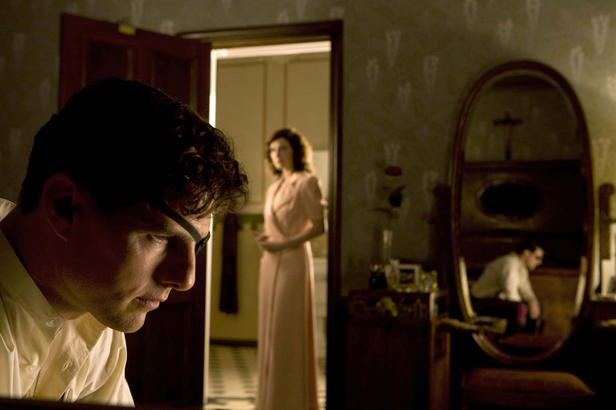 I
understand the eye patch initially gave you unexpected balance
problems.
I
understand the eye patch initially gave you unexpected balance
problems.
Tom Cruise:
Yeah, it did. I was surprised for a few hours and a few days, when
we started working on it, especially when it was dark, I lost depth
perception and balance. From visual
storytelling, I think it was a challenge for Bryan. He also
understood it's a different story depending on where that camera is
on my face different profiles, shooting with the patch and the
hand. It was a challenge always going into a room, or which angle we
shot.
What about
the creative decision of not going with German accents for everyone,
but letting the actors speaking their own natural way?
Bryan Singer:
Well, we didn't want that to be what the movie was about. It should
be exciting and the audience should be taken on a ride through the
film. The actors speak wonderfully the way they do in their current
dialects. We have an international cast:
American, Dutch, German, British actors. To have everyone try and
approximate German accents, when in reality they're supposed to be
speaking German which, I promise you, after the first 20 minutes,
you'd be sick of it would ultimately sound silly. And it would
distract from the drive of the plot. Though they can do it that's
Tom speaking German at the beginning of the movie. But it would
ultimately be not as fun for the audience.
Did your research find anything new about Hitler and his followers?
Bryan Singer:
That meeting between Von Stauffenberg and Hitler actually took place
it was his first time meeting Hitler and the Big Six. It was the
day after D-Day, and the thing that Stauffenberg noticed, and went
home and told his wife it's not in the film, but we keyed off this
testimony is that Gφring had on makeup. There was distrust [among]
them, clearly the Allies were at their door, and Hitler was detached
from what was going on. The only one that seemed to have a clue was
[Albert] Speer, but he was just the architect along for the ride.
Tom Cruise:
The scene where Stauffenberg goes to Hitler after Berghof, it's
challenging. I've grown up with the footage of Hitler at the
rallies. I was interested in the focus on Hitler, and to see him
particularly during that time period where he wasn't [yet] so
obviously, utterly insane. That sequence
has this eerie, terrifying feeling all of the detail where
Goebbels is looking at Gφring, all these little looks.
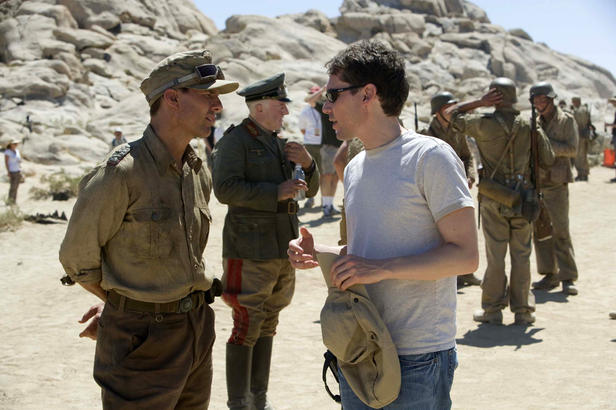 Bryan
Singer:
Hitler walked over and held Stauffenberg's hand, and acknowledged
his injuries and his heroism as a way of mocking his own people. He
would do that. He was always playing one against the other. It was
how Hitler rose in politics-through flattery, promises, and
backstabbing. He did it with Stalin and he did it with the German
people, and eventually that's how the war ended.
So it was nice to put hints of that kind of detached, laconic
Hitler in the Berghof scene that the people didn't get to see, in a
scene that genuinely happened, and all the specifics of that leading
up to [it]. The reason that we have such
detail in the third act of the film is because the Gestapo did a
very stunning investigation into this assassination attempt, and
trials were held and filmed. So we have
the benefit of all of those facts and information to inform our
story, as well as the research we've done, and actually talking to a
lot of people who were with Hitler.
Bryan
Singer:
Hitler walked over and held Stauffenberg's hand, and acknowledged
his injuries and his heroism as a way of mocking his own people. He
would do that. He was always playing one against the other. It was
how Hitler rose in politics-through flattery, promises, and
backstabbing. He did it with Stalin and he did it with the German
people, and eventually that's how the war ended.
So it was nice to put hints of that kind of detached, laconic
Hitler in the Berghof scene that the people didn't get to see, in a
scene that genuinely happened, and all the specifics of that leading
up to [it]. The reason that we have such
detail in the third act of the film is because the Gestapo did a
very stunning investigation into this assassination attempt, and
trials were held and filmed. So we have
the benefit of all of those facts and information to inform our
story, as well as the research we've done, and actually talking to a
lot of people who were with Hitler.
Tom Cruise:
I was surprised [at] Stauffenberg upbraiding the General [in the
desert]. He did that. He had those conversations with generals
exactly in that way.
Which is why he ended up in Africa?
Tom Cruise:
Which is why he ended up in Africa. He had actually court-martialed
friends of his for war crimes. His uncle was concerned for him,
arranged for him to go to Africa. And he was that outspoken with
generals. He was a supply officer [at the rear]. He was saying,
"What's happening? How can this happen? Why is this happening? This
guy's a liar. This is not the country that we want, that I've
wanted." The amount of desperation and
pain for him because he loved his country, [because] he wanted a
moral country, but one that participated in the world, not
annihilating [it], not [creating] the Holocaust, not [committed to]
world domination. He was a man that was able to really think for
himself within all of that propaganda, and recognized very early on
that insanity. At first he's thinking,
"Well, someone's got to stop him. Let's overthrow him." "Someone's
got to shoot that bastard," is a quote of his. And it's ironic that
those injuries actually put him in the position of high command
where he got on the inside, and realized that the only way to stop
this is from the inside. And really
recognizing that it wasn't just enough to kill Hitler. You had to
have something that's going to put people in a position where
they're going to follow you, because you have that oath. That oath
is so creepy, to get people to not be able to think for themselves.
As an American, to open the film [with it], that struck me.
Bryan Singer:
Because the army was compelled to give an oath. An army of 10
million people in Germany was compelled to give an oath to Hitler
himself, personally.
Did you think of Fred Zinneman's film
The Day of the Jackal, in the sense that people knew going in
what the end would be?
Bryan Singer:
Not so much; I hadn't seen it in awhile. But movies like that were
discussed.
Tom Cruise:
Yeah, definitely. You look at Apollo 13, Titanic any film
that's made out of a book [where] people know how it's going to end.
I had an idea when I read of course I heard of the briefcase under
the table. When I read it, it was so surprising to me, the story,
the details. And I was surprised in reading it that I was that
caught up and I was whipping through the pages.
Bryan Singer:
You might [know] if you know history. But I don't think audiences
know the full degree of how this particular story ends, and that's
an important thing.